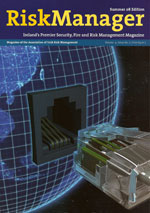Risk Manager
There’s a simple way to answer this for yourself. Choose any aspect of your own business, other than your own specialist expertise. How about your finances, administration, IT, marketing, sales or recruitment? Now ask yourself this question: “If I were going away for three months, who would I unreservedly trust with this part of my business?” Count the number of people you can name – it probably wont take you too long!
No surprise there, perhaps. But don’t our own promotional messages emphasise our trustworthiness? Don’t we claim to be able to “service all aspects” of some part of a client’s business? Don’t we boast that we’re the “professional you can trust”? Perhaps the very nature of these claims might hint as to why business development can sometimes be such an uphill struggle.
What gets in the way of trust?
The first rule of trust is that we must be able to listen. There’s a reason we have two ears, but only one mouth and we need to recognise the need to listen to our clients. All sorts of issues get in the way of listening: our needs, our agenda, the need to prove we are right, the desire to prove we can make a contribution. If we didn’t have to be right, what a difference that would make.
The second rule of trust is that we must service a need that really exists. If we first have to create the need, we become evangelical. Evangelists might be admired, but they’re less easily trusted, because they’re often seen as being more attached to their own message than that of their client.
Credibility
Credibility is important because while generalists are often viewed as “jack of all trades,” specialists tend to excel as trusted experts in their field. The specialist’s expertise is a key factor which inspires trust.
How we behave
The maxim “actions speak louder than words,” applies to the fourth rule of trust: the ability to keep promises. This includes our ability to be on time, to return calls, to send information as promised, to work within agreed budgets and to be consistent.
Our motives
We have all come across experts who are credible and reliable, yet their motives remain unclear. This brings us to the fifth and core rule of trust-building. Do our words and actions display selfish motives? Self-preoccupation ruins many professional relationships. Arrogance, ego and the need to be right may lead advisors to rush in with solutions when they should find out more about the problem.
Clients can generally find an excuse to get away from Mr. Ego. They find other more pressing problems to deal with. They say they can’t afford it yet, or they resort to “thinking about it” when they’re not sure of the advisor’s motives.
Simplicity
The sixth rule of trust is about clarity. If we cannot understand the service easily, we respond by asking questions. If the pricing is complex, or the service offering is unclear, clients have to ask more questions and there’s more for them to understand. This can make clients uncomfortable and as a result they might display this as mistrust.
Finally, we should try to relate to the client as a person. Being an outstanding expert is not enough anymore; it has to be a pleasure to deal with us too.
Your competitors are only a phone call or an email away, but every client who has a positive experience on both a personal and business level has an added reason to stay a client of yours.
Find our more about our Business Coaching services
If you would like to receive a copy of one of our business resources ’Top 100 Tips to Achieve More’, simply email me at paul@davisbusinessconsultants.com.
